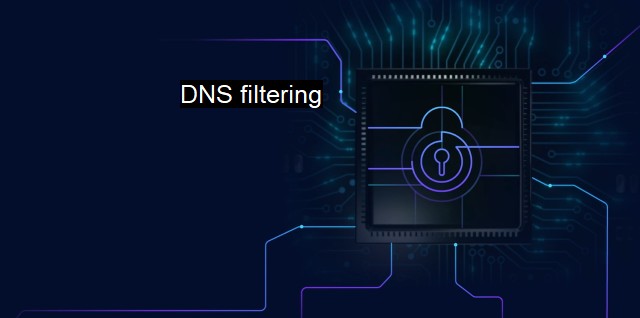What is DNS filtering?
DNS Filtering: Enhancing Cybersecurity Measures Through Advanced Web Filtering Techniques.
DNS filtering is a crucial element of the modern cybersecurity ecosystem with growing importance due to the escalating complexity and sophistication of cyber threats. DNS, or Domain Name System, serves as the Internet's phonebook. It translates human-readable domain names into the numerical IP addresses required by machines for website loading. DNS filtering, then, acts as a sieve within this process to block access to certain sites or pages deemed harmful or inappropriate based on various filtering parameters.The central idea behind DNS filtering is ‘control.' It provides individuals, businesses, and organizations with the ability to dictate what content types or sites can be accessed via their network. Fundamentally, it is a component of a network’s security apparatus aimed at preventing users from inadvertently or intentionally accessing malicious content.
When a user enters a website's domain name into their browser, a DNS server suiting as a translator will convert it into an IP address. If enabled, DNS filtering plays out at this stage: the system compares this domain name against its database of filtered sites. If it's deemed safe, the request proceeds; if it's marked as a threat, the filtering system would inhibit the transaction, blocking access.
One critical application domain of DNS filtering aligns well with antiviruses. DNS filtering combats phishing threats by inhibiting access to phishing sites. Phishing attacks, where cybercriminals mimic trusted entities to collect sensitive user data, are known to exploit domain names to mislead users. Antiviruses with integrated DNS filtering tools can help counter this threat more effectively. If a domain name matches the database of known phishing sites, the access is barred, shielding users from potential harm.
Notably, beyond phishing, DNS filtering also staves off malware attacks. Malware repositories or control servers usually possess dedicated domain names. When bound with robust antivirus programs, DNS filtering can intercept communication with these servers, hampering the malware's damaging potentiality before taking a toll on the affected system or network.
DNS filtering also proves useful in configuring parental controls and obeying regulations. For instance, school districts or businesses can blacklist certain site categories, such as explicit content or gaming sites. in corporate settings, it can help enforce security policies or compliance rules, like barring access to data-sensitive sites guarding against data exfiltration or leakages.
Despite its immense benefits, like any cybersecurity solution, DNS Filtering isn't flawless. Attackers might bypass these filters by using IP addresses directly or relying on a different DNS server. Another limitation stems from overblocking, where legitimate websites could mistakenly be added to the filtering database, restricting access to perfectly safe content.
Nonetheless, these drawbacks do not overshadow the merit of DNS filtering. They further underscore the need for complementing it with other security measures, such as antivirus & anti-malware tools, firewalls, intrusion detection systems, and regular cybersecurity audits.
DNS filtering is an essential gear within the broader security machinery required in today's digital landscape fraught with evolving threats. Integrated judiciously with widespread antivirus programs, it buttresses your cybersecurity defense, warding off threats and harmful content before they reach end users. Although not infallible and prone to evasion or overblocking, it brings considerable value within its niches, including phishing prevention, malware curbing, and policy implementation, among others. In such a sense, DNS filtering makes the digital space safer and controlled, marking its pivotal role in cybersecurity.

DNS filtering FAQs
What is DNS filtering?
DNS filtering is a cybersecurity technique used to prevent users from accessing malicious or undesirable websites by blocking their access through their domain name system (DNS) queries.Why is DNS filtering important?
DNS filtering is important in preventing users from accessing harmful websites that contain malware or viruses, protecting the user and the system from potential cyber attacks.How does DNS filtering work with antivirus software?
DNS filtering can work in conjunction with antivirus software by blocking access to websites that have been flagged as malicious or potentially harmful by the antivirus software. This provides an extra layer of protection against cyber threats.Can DNS filtering affect internet speed?
DNS filtering can have a minor impact on internet speed, as the process of filtering DNS queries can slow down the overall internet connection. However, this impact is usually negligible, and the security benefits of DNS filtering often outweigh any potential slowdowns.| | A | | | B | | | C | | | D | | | E | | | F | | | G | | | H | | | I | | | J | | | K | | | L | | | M | |
| | N | | | O | | | P | | | Q | | | R | | | S | | | T | | | U | | | V | | | W | | | X | | | Y | | | Z | |
| | 1 | | | 2 | | | 3 | | | 4 | | | 7 | | | 8 | | |||||||